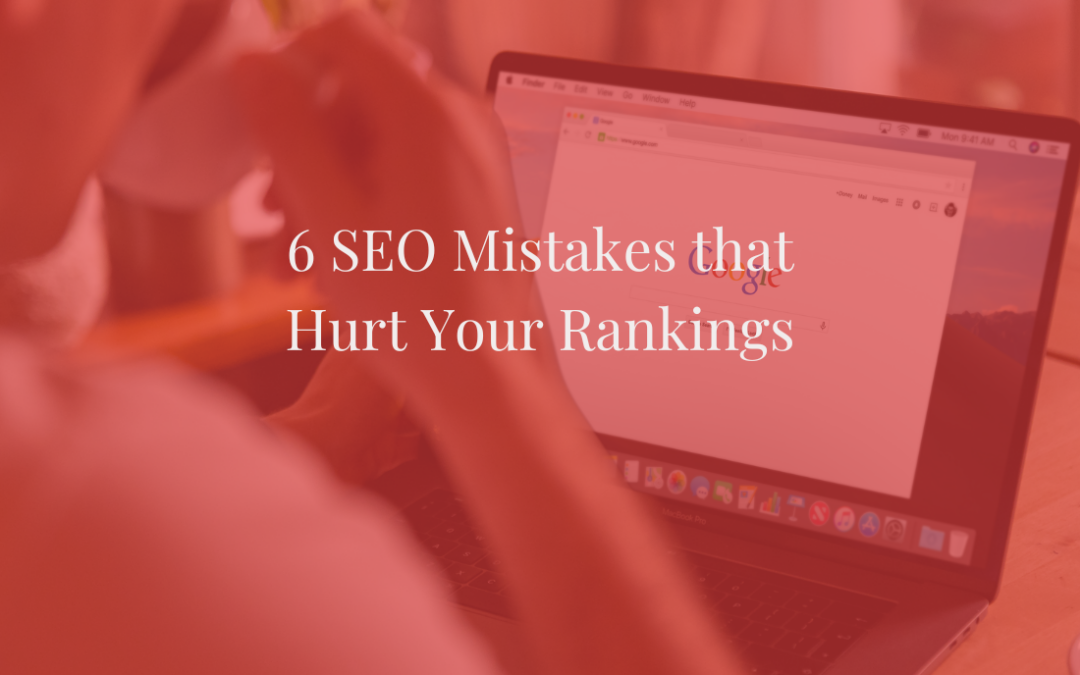In today’s digital landscape, having a strong online presence is essential for your small business or organization. Search engine optimization (SEO) plays a crucial role in making sure your target audience can find your website. However, many people unknowingly make SEO mistakes that hurt rankings, causing them to lose valuable traffic. Avoiding these errors can improve your visibility and ensure you thrive online.
1. Ignoring Mobile Optimization
What does mobile optimization mean? Also known as responsiveness, it means that your site looks as good or better on a mobile phone as it does on a desktop computer. One way to think about it is that you basically have more than one website living at your domain or website address. Depending on the size of the screen, your site can look completely different on a phone, tablet, or full size device.
With over half of all web traffic coming from mobile devices, a mobile-friendly website is no longer optional—it’s a necessity. Google prioritizes mobile-first indexing, meaning it primarily uses the mobile version of your site for ranking. Ignoring responsiveness for mobile phones will detrimentally affect your SEO rankings.
How Poor Mobile SEO Hurts Rankings
- Higher Bounce Rates: If users struggle to navigate your site on their phones, they’ll leave quickly, signaling to Google that your site isn’t user-friendly. A high bounce rate can negatively affect rankings, reducing visibility in search results.
- Slow Load Times: Mobile users expect fast loading speeds. A slow site can lower your ranking, as search engines prioritize user experience. Ensure your site loads within three seconds to prevent losing impatient visitors.
- Poor User Experience: Difficult navigation, unreadable text, and unclickable links all hurt engagement. A well-optimized mobile site should have clear menus, legible font sizes, and easy-to-click buttons.
Solution: Use responsive design, optimize images, and test your site with Google’s Mobile-Friendly Test (Google Developers).
2. Neglecting Page Speed
A slow website frustrates users and negatively impacts search rankings. Google considers site speed a ranking factor because it directly affects user experience.
Common Causes of Slow Websites
| Cause | Impact |
|---|---|
| Large images | Increases load time and consumes bandwidth, making pages sluggish. |
| Too many plugins | Slows down performance by increasing the number of HTTP requests. |
| Poor hosting | Reduces speed and reliability, leading to frequent downtimes. |
| Unoptimized code | Affects efficiency, making web pages take longer to load. |
Solution: Compress images using tools like TinyPNG, minimize HTTP requests by combining files, and use a content delivery network (CDN) to distribute content efficiently. Also, consider upgrading to a higher-quality hosting provider for improved site performance. Check your site’s performance using Google PageSpeed Insights.
3. Keyword Stuffing
Keywords help search engines understand your content, but overloading your site with them—known as keyword stuffing—can do more harm than good. Google penalizes sites that use unnatural, excessive keywords. It may seem counter-intuitive, but overusing keywords is a SEO mistake that can definitely hurt your rankings.
Signs of Keyword Stuffing
- Repeating the same phrase unnaturally in text: Overuse of the same keywords makes content sound robotic and unnatural.
- Stuffing keywords in meta descriptions or alt text: This makes descriptions unreadable and doesn’t add value to the user experience.
- Writing content that sounds robotic: If content feels forced or awkward, it may indicate excessive keyword usage, which can reduce credibility.
Solution: Focus on natural keyword placement and use variations. Instead of forcing keywords into every sentence, incorporate them naturally within meaningful content. Tools like Yoast SEO can help balance keyword density.
4. Using Duplicate Content
Search engines prioritize original content. If your site has duplicate content—whether copied from another site or repeated across your own pages—Google may lower your rankings.
How Duplicate Content Hurts SEO
- Splits Ranking Power: Google doesn’t know which version to rank, leading to diluted ranking potential.
- Reduces Credibility: Users may see it as untrustworthy or spammy, causing lower engagement and trust in your brand.
- Wastes Crawl Budget: Search engines have a limited budget for crawling pages, and duplicate content can prevent them from indexing your most important pages.
Solution: Use canonical tags to indicate the preferred version of a page, and create unique, valuable content for your audience. Regularly audit your site for duplicate content issues with tools like Siteliner.
5. Ignoring Local SEO
For small businesses who provide more than just online services or sales, local SEO is essential. If you’re not optimizing for location-based searches, you’re missing out on nearby customers who are actively looking for your services.
Whenever you are on the road and need something, what do you search for on your device? “(That thing) near me,” right? You affect your rankings, and it’s really only the top three listings that get the business, when you pay attention to local SEO.
Local SEO Best Practices
- Claim Your Google Business Profile: Keep it updated with accurate business hours, address, and contact details. An optimized profile increases visibility in local search results. Cardinalis offers this service, and you can find out more about it here.
- Use Local Keywords: Mention your city or region in headings, meta descriptions, and content to help search engines match your site to local searches.
- Encourage Reviews: Positive reviews improve credibility and rankings. Ask satisfied customers to leave feedback on platforms like Google and Yelp. If they do, make sure you respond to them. Search engines like to see interaction.
- Optimize for “Near Me” Searches: Many users search for services near them, so optimizing your content to include terms like “best bakery near me” can improve your chances of appearing in local searches.
Solution: You will find several free SEO tools with plenty of optimization tips at Moz’s SEO website. Also, engage with local directories like Yelp, Angie’s List, and Bing Places to expand your reach.
6. Failing to Optimize Title Tags and Meta Descriptions
Title tags and meta descriptions are essential for click-through rates. These tell search engines what your post or page are about, and help them connect your with the intent of a searcher. If they’re missing, duplicated, or poorly written, search engines and users may overlook your content.
Best Practices for Titles and Meta Descriptions
- Keep title tags under 60 characters and include primary keywords.
- Write compelling meta descriptions that summarize content in 155-160 characters, making them informative and engaging.
- Avoid duplicating tags across multiple pages. Each page should have a unique title and meta description tailored to its content.
- Use action-oriented language to entice clicks, such as “Discover the Best SEO Tips” or “Boost Your Website’s Ranking Today.”
Solution: Use tools like SEMRush to audit your metadata and identify areas for improvement.
Conclusion
Avoiding these common SEO mistakes that hurt rankings can significantly improve your small business’s online visibility. By optimizing for mobile, improving site speed, focusing on quality content, and using strategic keywords, you can strengthen your search presence.
Quick Recap:
- Optimize for mobile and page speed to enhance user experience and ranking potential.
- Use keywords naturally to avoid penalties from search engines.
- Avoid duplicate content by ensuring each page offers unique value.
- Strengthen local SEO by claiming your Google Business Profile and using location-based keywords.
- Improve metadata and internal links to make your site more navigable and search-friendly.
- Track performance with analytics tools to refine your strategy over time.
By implementing these strategies, your website can climb search engine rankings, attract more visitors, and ultimately grow your business.

